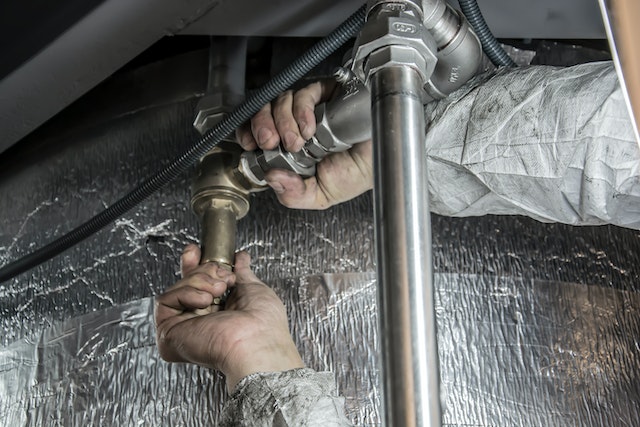A dry and healthy home environment is fundamental to our well-being, setting the foundation for safety and comfort. Beyond the visible inconveniences, a damp living space can pose significant threats to our health. Health risks of water damage in your home often lurk unnoticed, transforming what should be our safe haven into a breeding ground for a variety of concerns. As we get deeper into this topic, we’ll shed light on the potentially severe implications of water damage and the importance of addressing it promptly to safeguard our homes.
What Lies Beneath the Surface
What lies beneath the surface reveals that water damage is not just a superficial issue. While discolored patches or peeling paint might seem merely unsightly, they often mask more severe, hidden concerns. Beneath damp walls and moist flooring, the real threats fester. Structural wood may rot, weakening the core of your home. Electrical installations can corrode, posing a fire risk. Insulation can become less efficient, leading to higher energy bills. Moreover, trapped moisture becomes a thriving hub for harmful molds and bacteria, compromising indoor air quality. These underlying problems, largely invisible at first glance, demonstrate that water damage’s true dangers go far beyond mere aesthetics and touch upon the very safety and health of a household’s occupants.

There’s a high chance insulation gets damaged, which can increase the electrical bill.
Health Risks of Water Damage in Your Home: Mold and Mildew
These silent intruders stealthily creep into homes plagued by water damage. Persistent dampness from leaks or flooding creates the ideal environment for these fungal foes to flourish. As they spread unseen behind walls or under floors, they release spores into the air. When inhaled by home occupants, these spores can cause a slew of health issues. Respiratory problems, exacerbated by the constant inhalation of these irritants, are among the most common complaints. Moreover, mold exposure can trigger allergies, manifesting in symptoms like sneezing, skin rashes, and eye irritation. The impact can be even more detrimental for individuals with weakened immune systems or pre-existing conditions, emphasizing the urgency of addressing the matter and its fungal aftermath.
Contaminated Water
In the midst of moving, one concern that often goes unnoticed is contaminated water. Transitioning to a new residence may expose individuals to unfamiliar water sources, which, if contaminated, can pose severe risks. From bacteria to harmful chemicals, such pollutants can lead to diseases like cholera, dysentery, and hepatitis A when ingested. Direct contact might result in skin and eye infections. According to the analysis done by Best Movers in Florida, a staggering 30% of individuals reported water-related issues after relocating. This emphasizes the need for thorough checks and assessments of water quality when transitioning to a new home, ensuring a safe environment.
When Your Home Turns Against You
Persistent moisture infiltration compromises a building’s bones, silently eroding its structural integrity. When saturated, materials like wood and drywall start to decay, making them less capable of bearing weight or withstanding stress. The results can be catastrophic: weakened floorboards may give way, resulting in dangerous trip hazards or even full-fledged falls. Worse still, a water-laden ceiling might suddenly collapse, posing a direct physical threat to the home’s inhabitants. Such unforeseen disasters underscore the urgency of addressing water damage promptly. After all, when the very framework of your home becomes unreliable, the safety and well-being of its occupants hang precariously in the balance.

One of the health risks of water damage in your home is air pollution and allergies.
Air Quality Concerns: Breathing in the Dampness
When considering the health risks of water damage in your home, one must not overlook air quality concerns. It significantly degrades indoor air quality as it fosters the growth of mold, mildew, and other allergens. These irritants, released into the atmosphere, are then inhaled, leading to a range of health concerns. People with asthma may experience more frequent or severe attacks. Those susceptible to allergies could find their symptoms amplified. Furthermore, even individuals without pre-existing conditions might face respiratory issues, as the compromised air introduces a constant onslaught of harmful particles into their lungs. The very act of breathing becomes a health concern in a water-damaged environment.
Pests and Microorganisms
The persistent dampness not only deteriorates the structure but also acts as an inviting beacon for various pests, from insects like cockroaches and silverfish to larger nuisances like rodents. These intruders aren’t merely annoying; they introduce many health risks into the living space. Rodents, for instance, can carry diseases like hantavirus and salmonella. Insects can contaminate food sources and introduce harmful bacteria. The presence of such pests amplifies the challenges of maintaining a clean, healthy environment in a water-damaged home, emphasizing the imperative to address water issues promptly.
Safeguarding Your Home
Safeguarding your health and home is crucial in the face of potential water damage threats. To protect your home from flooding and the consequent hazards, vigilance, and proactive measures are essential. Familiarize yourself with early signs of water damage: discolored patches on walls, a musty smell, or unexplained dampness. Regular home inspections, especially of vulnerable areas like basements or attics, can spot issues before they exacerbate. Ensure that drainage systems are functioning correctly, and consider installing flood barriers if in a flood-prone zone. Addressing leaks promptly, no matter how minor they seem, can prevent more significant damage in the long run.

All the destruction can cost you a fortune.
Emotional and Financial Toll
Homeowners grapple with mounting stress and anxiety from visible damage. This turmoil extends to property values, with significant water damage potentially slashing market prices complicating sales or refinancing efforts. Restoration doesn’t come cheap either; extensive main water line repairs and replacements can strain finances. Insurance might seem a saving grace, but intricate claim processes, rising premiums, and uncovered damages add to the burden. Without addressing the core issue, the cycle of repairs and costs persists. Hence, investing upfront in preventive strategies safeguards the home and offers substantial long-term financial prudence.
Summing It Up
Addressing the health risks of water damage in your home cannot be emphasized enough. The hidden dangers stretch beyond immediate damage, directly impacting overall well-being. Prioritizing home maintenance is essential for safety and peace of mind. Let’s be vigilant and proactive, ensuring our homes remain sanctuaries of health and comfort.
